2024 SDG 8 English
- 8.2.1 Employment practice living wage
- 8.2.2 Employment practice unions
- 8.2.3 Employment policy on discrimination
- 8.2.4 Employment policy modern slavery
- 8.2.5 Employment practice equivalent rights outsourcing
- 8.2.6 Employment policy pay scale equity
- 8.2.7 Tracking pay scale for gender equity
- 8.2.8 Employment practice appeal process
- 8.2.9 Employment practice labour rights
- 8.3.1 Expenditure per employee
- 8.4.1 Proportion of students with work placements
- 8.5.1 Indicator: Proportion of employees on secure contracts
8.2.1 Employment practice living wage
The salary payments for faculty and staff are made according to the relevant laws and regulations established by the central government and the university. These salaries are adjusted by a government review committee, which considers changes in the cost of living, average national income, population, economic growth rate, and salary levels in the private sector. The average monthly salary at our university is NT$104,194 (NTNU Salary Payment Table for Faculty), which is higher than the national average monthly salary in the education sector of NT$33,215 and the government-mandated living wage of NT$27,470.
8.2.2 Employment practice unions
Collective bargaining
According to the regulations for implementing labor-management meetings, the University convenes labor-management meetings every three months to coordinate labor-management relations and discuss working conditions, employee welfare, and other related matters. In 2023, four sessions were held. The current labor-management meeting includes five representatives each from labor and management (current representative list), with a term of four years (from September 11, 2022, to September 10, 2026). The meeting minutes and relevant information are published on the Office of Human Resources website.
Review and Adjustment of Faculty and Staff Rights
NTNU continually reviews and adjusts the rights and benefits of faculty and staff through relevant meetings such as the Contract Personnel Review Committee, Academic and Administrative Supervisors’ Meetings, Administrative Meetings, and University Affairs Meetings. Any adjustments will be announced on the Personnel Office’s website, specified in employment contracts, or compiled into a handbook (e.g., Handbook for New Faculty).
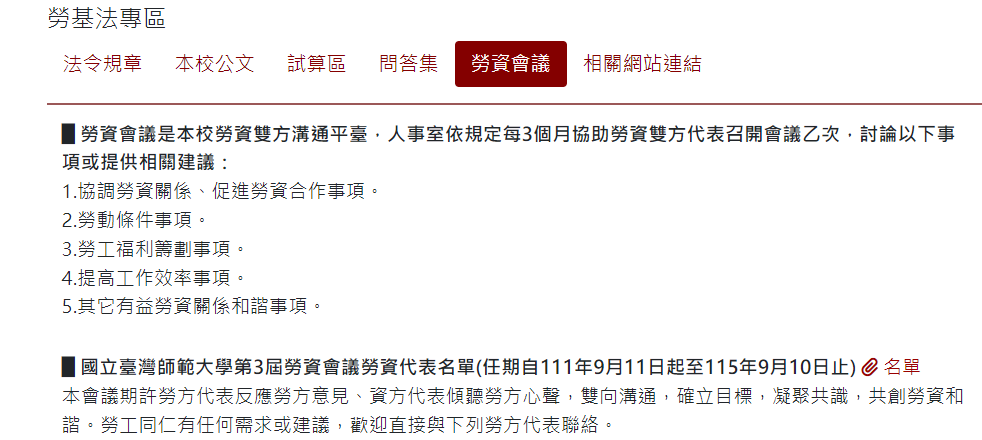
8.2.3 Employment policy on discrimination
By Taiwan’s “Employment Service Act,” the University ensures that the recruitment and promotion of personnel in all categories are based on job experience, professional competence, and developmental potential. There is no discrimination based on religion, sexual orientation, gender, or age.
The University is committed to promoting gender equality. It has implemented several gender equality regulations, including the “Guidelines for Gender Equity Education at National Taiwan Normal University,” the “Establishment Guidelines for the NTNU Gender Equality Education Committee,” and the “NTNU Regulations on the Prevention and Handling of Gender Discrimination, Sexual Assault, Sexual Harassment, and Sexual Bullying.” These measures ensure that faculty and staff are not subjected to differential treatment in the workplace based on gender, gender traits, gender identity, or sexual orientation, creating a safe and equitable working environment. (All gender equality-related regulations are published on the Office of Administrative Affairs’s website.)
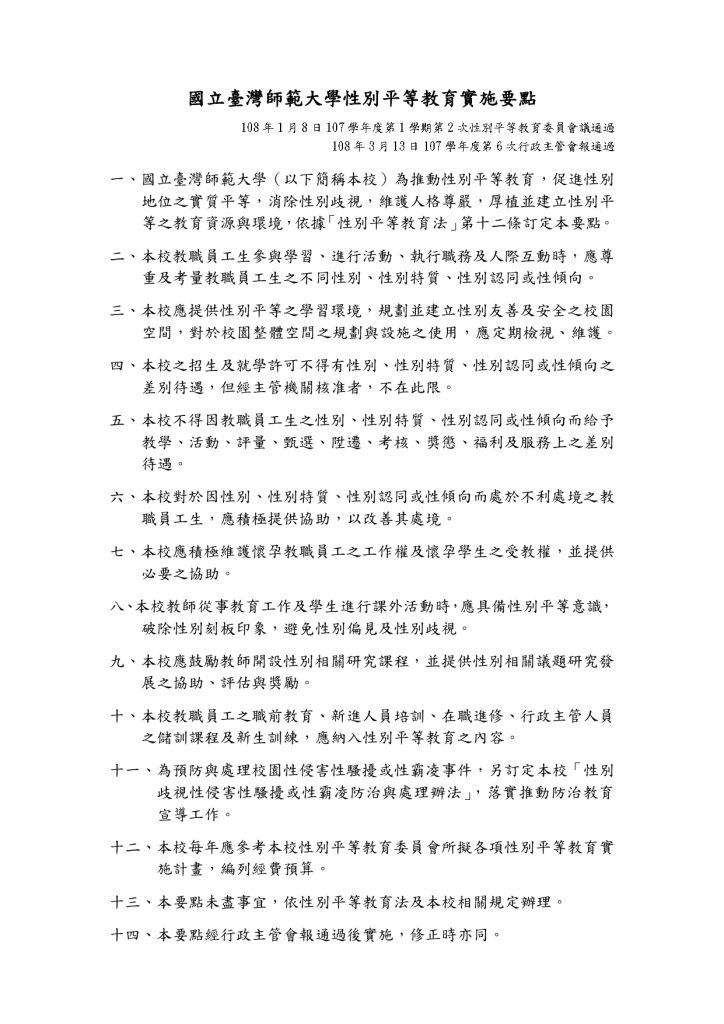
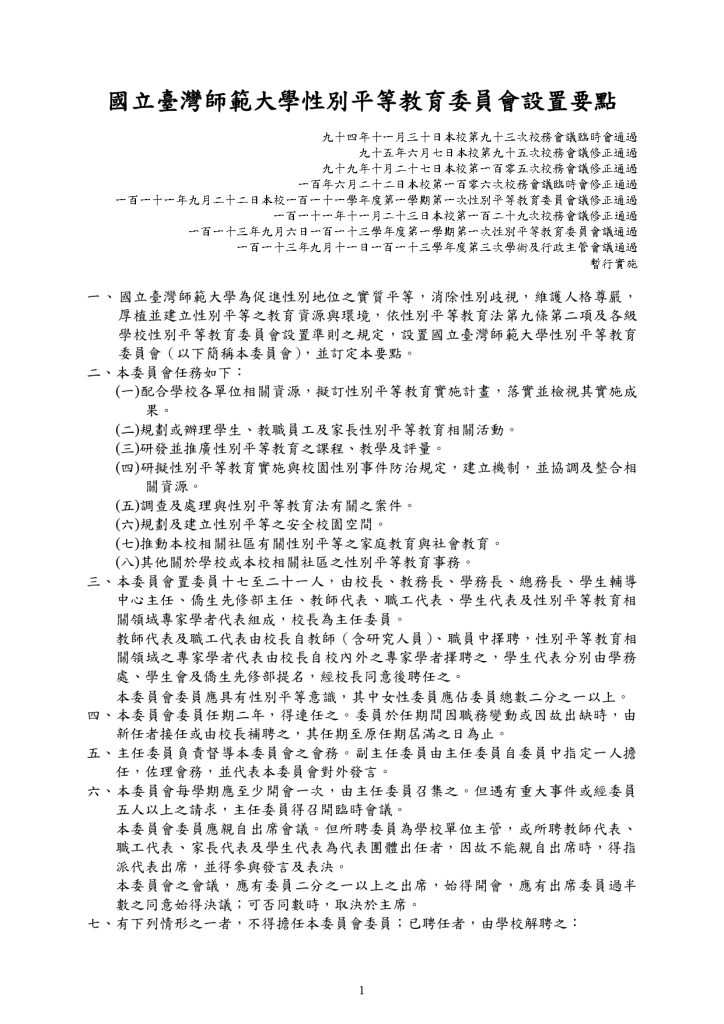
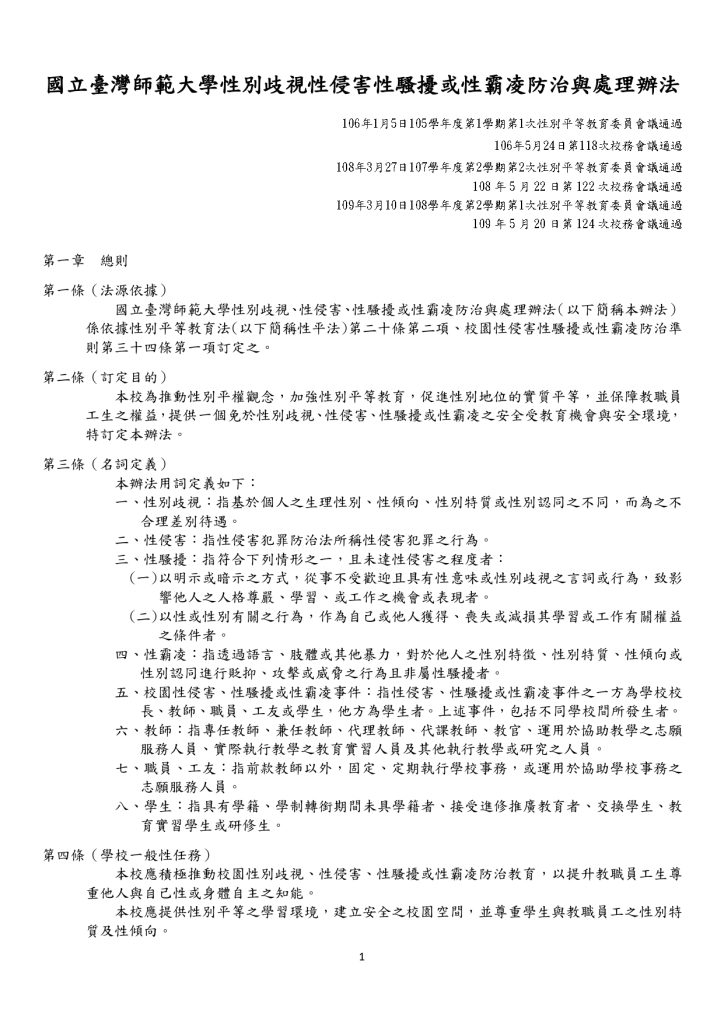
8.2.4 Employment policy modern slavery
Against Forced Labor
By national laws such as the ” Public Functionary Service Act,” “Regulations for Teachers’ Leave,” “Labor Standards Act,” and the NTNU’s ” Contractual Staff Work Rules,” the University regulates the working hours, rest periods, leave, and vacation arrangements for faculty and staff to prevent forced labor. Additionally, in response to operational needs, it has established the “Guidelines for the Control of Overtime Pay” to regulate employee overtime hours.
Against child labor
The University follows the Labor Standards Act, Teachers’ Act, Civil Service Protection Act, Public Functionary Service Act, and the NTNU’s ” Contractual Staff Management Directives ” in handling the employment of faculty and staff, ensuring that no child labor is employed.
8.2.5 Employment practice equivalent rights outsourcing
Contracts for Outsourced Labor in Accordance with the Law
The University has outsourced two types of work—cleaning and security services—employing 103 people in total. Contracts are signed in compliance with regulations, ensuring the protection of labor conditions, employment rights, prohibition of gender discrimination, prevention of sexual harassment, and obligations regarding safety, health, and other relevant rights and responsibilities.
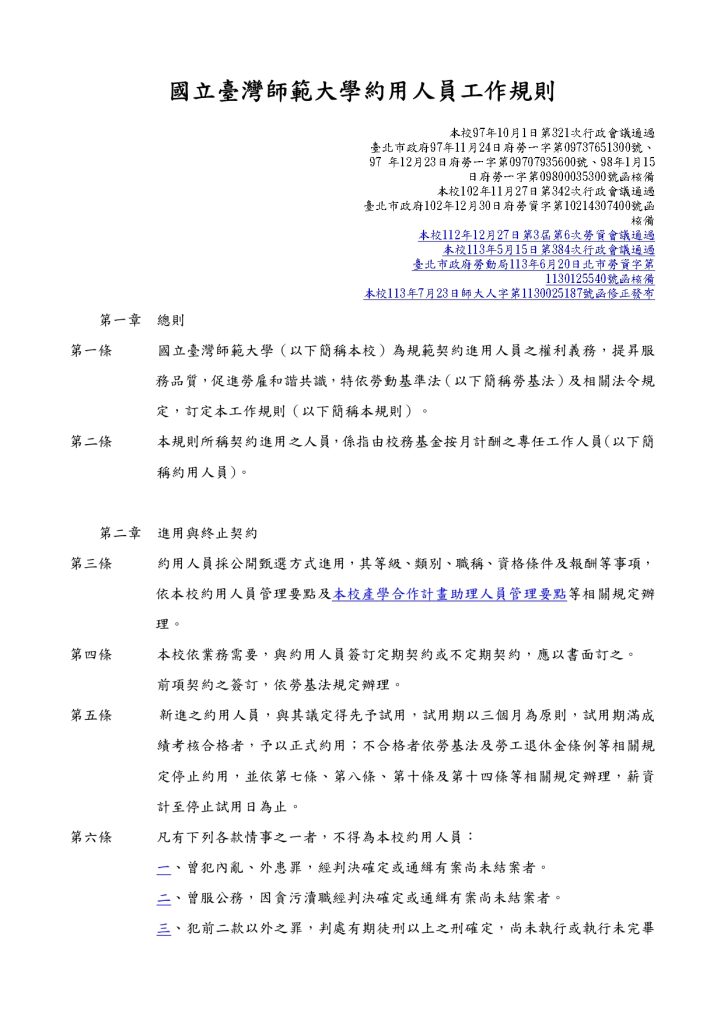
8.2.6 Employment policy pay scale equity
According to Article 5 of the “Guidelines for Gender Equity Education at National Taiwan Normal University,” the University shall not discriminate against faculty, staff, or students based on gender, gender traits, gender identity, or sexual orientation in teaching, activities, evaluations, selections, promotions, assessments, rewards and punishments, benefits, and services. Therefore, faculty and staff salaries are determined based on the “National Taiwan Normal University Salary Payment Table for Faculty” and the ” National Taiwan Normal University Civil Servants Detailed Salary Table.” Salaries are adjusted annually based on job performance, and there shall be no wage disparity based on gender, sexual orientation, marriage, childbirth, or pregnancy.
8.2.7 Tracking pay scale for gender equity
Faculty and staff salaries are determined by relevant laws and regulations established by the central government and the University, such as the “Teacher Remuneration Act” and the “Public Functionaries Remuneration Act.” Salary adjustments are made by the government review committee, considering factors such as price fluctuations, average national income, population, economic growth rate, and private sector wage levels. There is no wage disparity based on gender, sexual orientation, marriage, or pregnancy. In 2023, the average salary for male and female educational personnel was NT$111,708 and NT$107,738, respectively, while the average salary for male and female civil servants was NT$69,189 and NT$70,233, respectively.
8.2.8 Employment practice appeal process
By the ” National Taiwan Normal University Organizational and Review Guidelines for Faculty Grievances Committee” and the “NTNU Organizational Directives for Employee Appeals, Arbitration, and Committee” the University has established ” Faculty Grievances Committee” and ” Employee Appeals and Arbitration Committee” to ensure the rights of faculty and staff. Suppose any faculty or staff member believes that the measures taken by university units are illegal or inappropriate or that their rights have been violated due to inaction. In that case, they may file an appeal with the committees above. The procedures for filing and reviewing appeals are clearly outlined in the guidelines. In 2023, the University received a total of three appeal cases.
Additionally, to prevent various forms of unlawful workplace harassment (physical, psychological, verbal, sexual harassment…etc), the University has established a Prevention Plan for Unlawful Workplace Harassment During the Performance of Duties. The plan includes related training, the establishment of protective measures, and procedures for handling incidents involving victims. It also outlines a process for responding to physical or psychological harassment encountered during duties. Beyond preventing workplace harassment, the plan provides channels for coordination and investigation, along with continuous care and follow-up support for affected individuals.
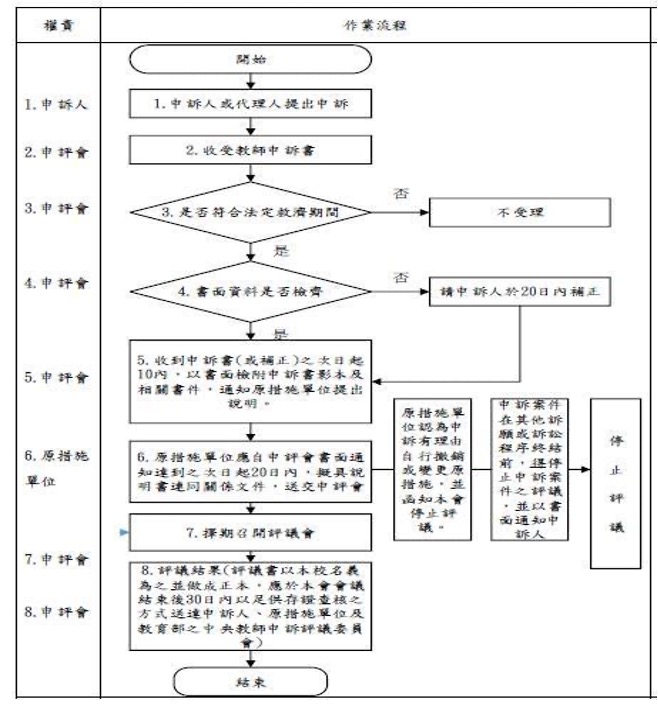
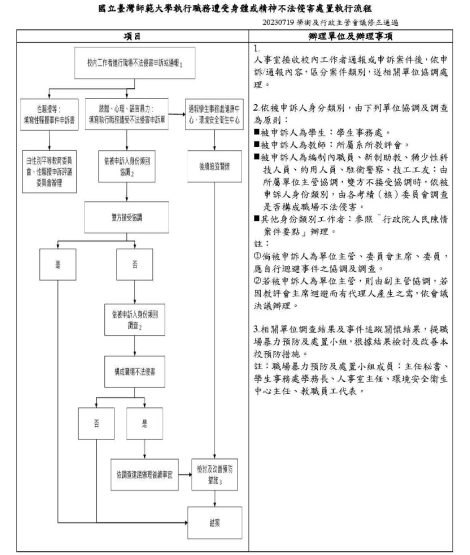
8.2.9 Employment practice labour rights
- Collective bargaining:
According to the regulations for implementing labor-management meetings, the University convenes labor-management meetings every three months to coordinate labor-management relations and discuss working conditions, employee welfare, and other related matters. In 2023, four sessions were held. The current labor-management meeting includes five representatives each from labor and management (current representative list), with a term of four years (from September 11, 2022, to September 10, 2026). The meeting minutes and relevant information are published on the Office of Human Resources website.
- Protection of Female Workers’ Rights:
To safeguard the rights of female workers, the University has implemented various measures that address their physiological, psychological, and workplace safety needs, promoting substantive gender equality.
- Maternity Health Protection and Childcare Support:
The University has developed a “Maternity Health Protection Plan” to ensure female employees’ physical and mental health during childbearing years. Breastfeeding rooms have been established on all three campuses (Heping, Gongguan, and Linkou), with the breastfeeding room at the Gongguan campus receiving the 2023 Excellent Breastfeeding Room certification from the Taipei City Department of Health. By the “Gender Equality in Employment Act,” faculty and staff with children under two years old who need to breastfeed (or express milk) are granted 60 minutes of breastfeeding time each day.
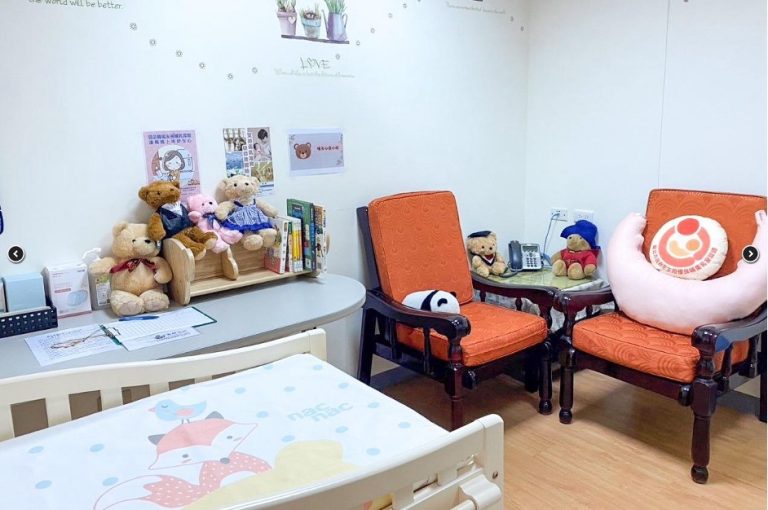
- Flexible Work Hours for Staff:
To support staff with work or childcare needs, the University allows flexible working hours in accordance with the ” Directives Governing Flexible Work Hour Management,” enabling employees to balance family responsibilities with work.
- Menstrual and Maternity Leave:
By the “Rules Governing the Public Functionaries’ Request for Leave” and the University’s “Contractual Staff Work Rules,” the University provides menstrual leave, maternity leave, miscarriage leave, and prenatal leave, ensuring that women receive adequate rest and protection during special physiological periods.
- Gender Equality Education and Sexual Harassment Prevention:
The University has established a Gender Equality Education Committee, which held a Gender Equality Education lecture and is dedicated to preventing sexual harassment, sexual assault, and sexual bullying. The committee is also responsible for investigating and handling cases related to gender equality (Faculty and Staff Sexual Harassment Case Investigation Flow Chart). The university library encourages faculty and students to organize a reading club, including discussions on gender equality issues and solutions.

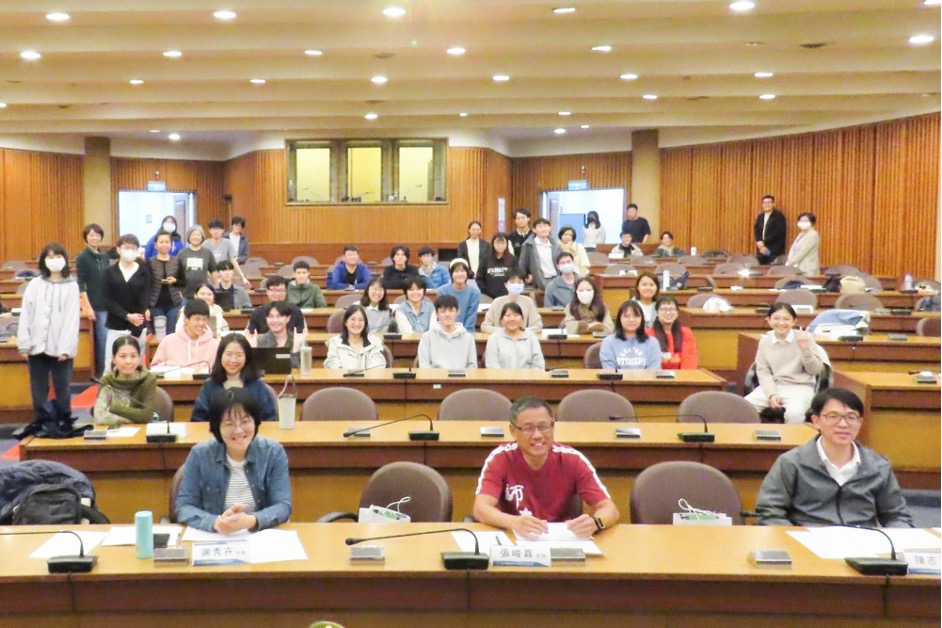
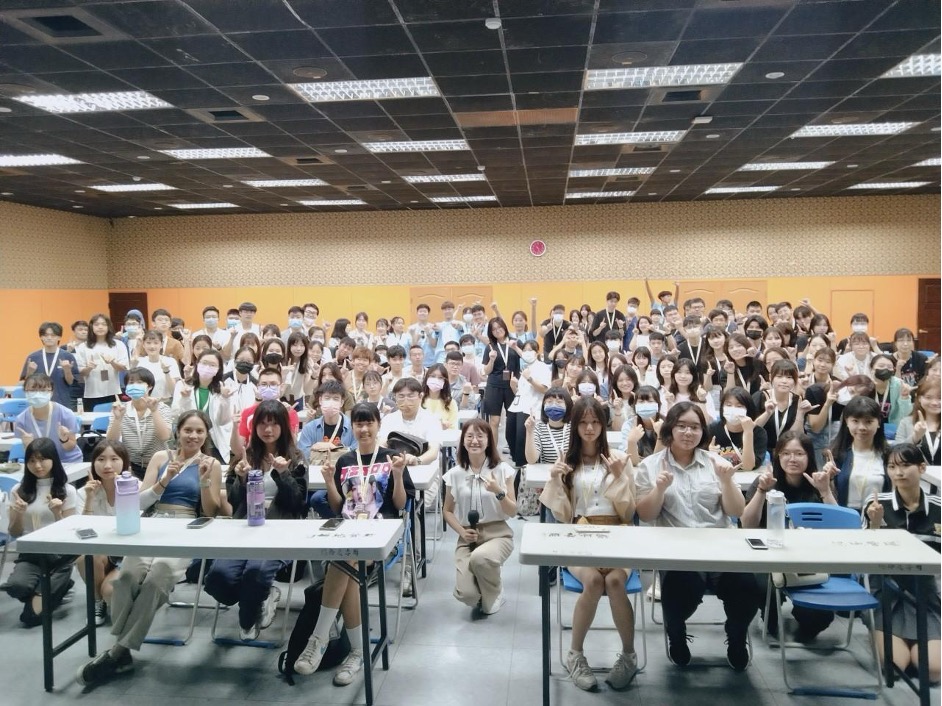
- Strengthen benefits for international Faculty:
To attract and assist international faculty in smoothly integrating into life in Taiwan, the University has established the ” National Taiwan Normal University Guidelines for International Talent Recruitment Subsidies,” offering various benefits. For newly hired foreign teachers and technical personnel who do not hold Taiwanese nationality or have lived abroad continuously for more than three years and returned to Taiwan for less than six months, a one-time relocation allowance of NT$100,000 is provided, along with a subsidy for a one-way economy class airfare to Taiwan. Additionally, to support the needs of international faculty wishing to visit their home countries, they may receive up to two round-trip airfare subsidies within the first six years of employment, with each trip capped at NT$80,000.
The University also strives to create a bilingual-friendly environment by providing bilingual signage, English translations of regulations, forms, and system interfaces, and compiling a handbook for foreign teachers. Furthermore, regular foreign faculty exchange forums promote communication and interaction among international staff.
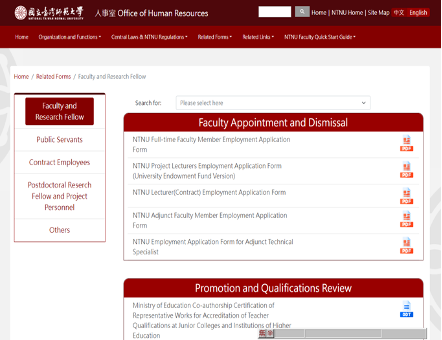
- Faculty and staff physical and mental health support system:
To enhance the physical and mental well-being of faculty and staff, the University has implemented several initiatives, including:
Establishment of Employee Assistance Programs: The University has formulated the ” NTNU Employee Assistance Program” and the “Guideline for Establishment of the Community Counseling Center“. In addition to providing subsidies for health checks, the University has also established a Community Counseling Center that offers psychological counseling and consultation services.
Exercise Classes for Faculty, Staff, and Students: The University offers a variety of fitness classes, including aerobics, yoga, swimming, table tennis, and tennis, for faculty, staff, and students to sign up and participate in.
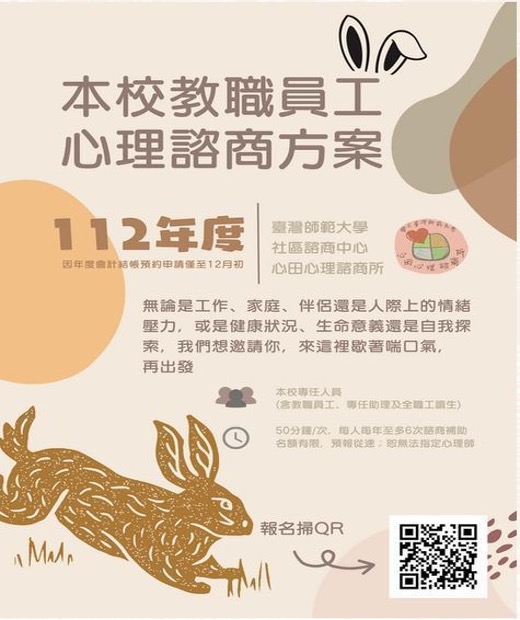
8.3.1 Expenditure per employee
The total number of full-time faculty and staff is 3,785. The University’s annual expenditure is NT$7,820,998,595, and the average expenditure per person is NT$2,066,314.03.
8.4.1 Proportion of students with work placements
The total student enrollment was 14,080 in the 2022 academic year. In 2023, 198 internship-related courses were offered, with 3,220 students enrolled. The Office of Student Affairs also provided 374 internship placements, with 592 students participating in internships. The proportion of students with internship opportunities was 27%.
8.5.1 Indicator: Proportion of employees on secure contracts
In 2023, the University employed 3,785 full-time faculty and staff members, of which 3,056 had signed secure contracts, representing 80.74% of the total.

